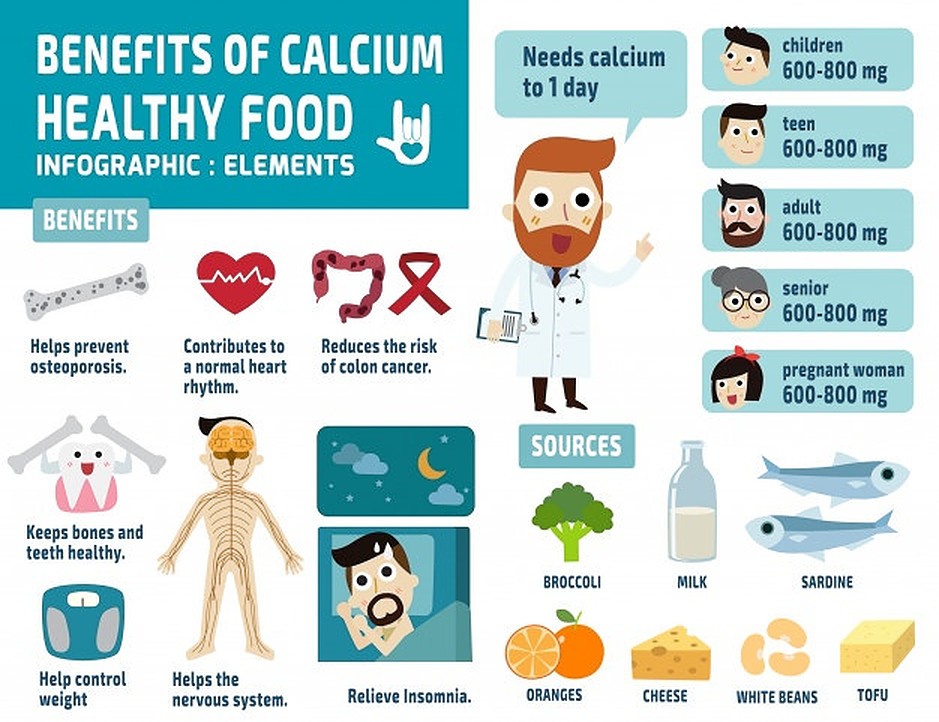It is no secret that calcium helps build strong bones, but did you know it also plays a role in improving
dental health? Calcium helps with strong teeth and jaw bones and is a vital nutrient behind a beautiful smile and healthy oral routine.
This essential mineral is one of the most abundant in the body, stored in bones and teeth. From infancy to elderly age, calcium plays a huge role in health and wellness.
Our experts at Vellore Woods and Dentistry can advise on proper calcium intake and oral health when you make an appointment, but first let’s learn exactly why our teeth need calcium.
Improve Oral Health
Bacteria naturally occurs in the mouth from food and drink and ultimately produces harmful substances that erode enamel from the outer layer of the teeth. Enamel can weaken over time and cracks can form that allow bacteria to reach the interior of teeth. Bacteria can lead to tooth decay, gum disease, and cavities.
Calcium helps with all of this by fortifying against oral bacteria. This nutrient works to remineralize tooth enamel, allowing it to repair any damage caused by bacteria. Just like with building strong bones, increasing calcium intake allows for stronger and resilient teeth. Calcium is stored in bones and teeth. Calcium is a nutrient that helps to build resistance against decay and disease, making it essential to diet and supplementation. This nutrient helps to reinforce enamel, prevent cavities, and protect your teeth.
Lifetime of Growth
Calcium is often associated with strong bones, but is also goes a long way in developing strong teeth as well. Teeth are basically bones that are denser than skeletal bones. Calcium contributes to teeth and bone development as you grow and age, so it is really important over your entire lifetime. At a young age teeth begin to develop and calcium is a huge factor in helping teeth grow health and strong. After they grow in fully, teeth have to be protected against decay and calcium aids in this.
Teeth are living tissue that have to be well-cared for and cannot rely on naturally occurring calcium. While the body can create calcium from bones and teeth if needed, growth will really only occur through natural calcium intake. This is because calcium is so critical to several bodily functions, including vessel, muscle, and nerve function. If calcium is pulled from the teeth, cavities are more likely to develop.
Osteoporosis and Calcium
As people age, the chance of developing osteoporosis increases as well as tooth loss through periodontal disease, cavities, and more. These risks increase because calcium and Vitamin D absorption declines and can lead to significant health complications.
Osteoporosis is a concern for oral health because it can develop in jaw bones, leading to tooth loss. When bone mineralization and density decreases, the risk of periodontal disease will increase.
All of this can be avoided with sufficient calcium intake, either through diet or supplementation, and can lead to tooth protection and strengthening.
Temperature Sensitivity
Enamel is the protective layer of teeth that helps with sensitivity to hot or cold food and drink. Without that enamel, it can be difficult to enjoy certain foods and drinks, and it’s easier to develop cavities.
Calcium strengthens that enamel layer, helping to protect against temperature sensitivity. Enamel is comprised of calcified tissue formed by calcium. With the help of calcium and a stronger enamel layer, you will be on your way to fully enjoying cold ice cream or hot snacks with no pain.
Hypocalcification
If your enamel does not have enough calcium, hypocalcification is likely to occur. This means that enamel is still present, but parts of it are thin and weak, causing a chalky or opaque appearance. Teeth without a strong enamel are more susceptible to decay and other issues.
Hypocalcification can be caused by a number of things, including genetics, but it can be combatted with enough calcium intake.
Build Calcium into Your Routine
Building calcium into your routine mainly takes place through a healthy diet, which includes everything from dairy products to leafy greens. It is important to know that calcium does not just mean dairy products. Many natural foods like fish, beans, broccoli, and yogurts also include ample amounts of calcium for daily intake.
If you are having trouble with sufficient calcium intake, supplements are always an option. Talk to us about calcium supplements and how they might help your oral health.
How Much Calcium Do You Need?
Recommended daily intake of calcium varies, so always consult your dentist if you are unsure. The general
recommendation is 800 mg of calcium daily in order to prevent gum disease. This amount might vary based on age or other conditions, which is why dentist recommendation will be helpful.
Having enough calcium every day is easily accomplished with the right diet and supplementation. Calcium can be found in many foods like leafy greens, cereals, juices, and dairy products.
Some general tips on daily calcium intake include:
- Adults, especially nursing mothers, should have 1,000 mg per day
- Older adults need 1200 mg per day
- Kids between ages of 1 to 8 should have 500 – 800 mg per day
- Older children and teens up to age 18 need 1300 mg per day
More than Flossing and Brushing
Flossing and brushing are important steps of any daily routine for oral health, but this is not the only way to a healthy dental routine. In fact, there is a lot more to oral health than flossing and brushing regularly.
In addition to flossing, brushing, and visits to the dentist, a shiny, strong smile is possible with a balanced diet and the right amount of calcium. Through regular visits to Vellore Woods Dentistry, we will connect you to all the need-to-know information about maintaining excellent oral health and increasing calcium-intake.

